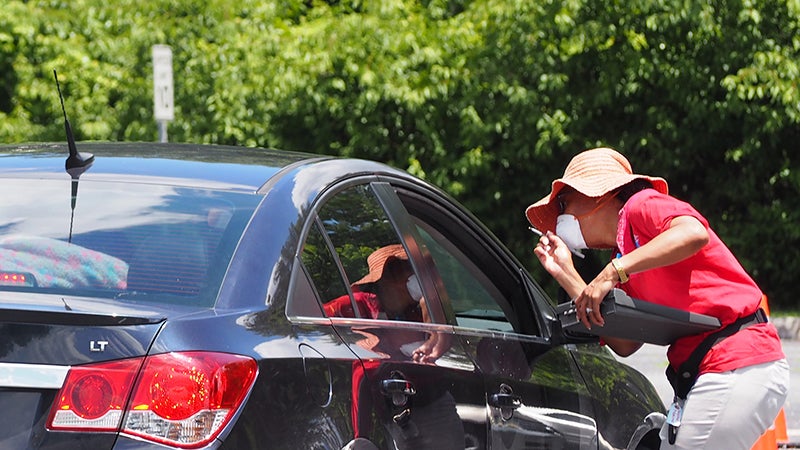Governor relaxes COVID-19 restrictions
Published 5:44 pm Tuesday, March 30, 2021
In the race between vaccines and variants in Virginia, no victor has emerged, though the state is among the national notables in the number of people vaccinated.
“We’re in a race to get everyone vaccinated before we run up against some variant that is either resistant or more deadly,” state health commissioner Dr. Norman Oliver said at a March 9 briefing.
But because of the state’s accelerated vaccination process since a sluggish start, Gov. Ralph Northam said at his latest briefing March 23, he will loosen restrictions on gatherings and capacities at entertainment and sports venues beginning April 1.
“This combination, lower case counts and higher vaccinations,” Northam said, “means that we can consider how to slowly and safety ease some of the mitigation measures we’ve had in place.”
Nearly one in every four residents has received at least one dose of the COVID-19 vaccine — more than 2.1 million people — and nearly 1.2 million are fully vaccinated.
Virginia is receiving about 500,000 vaccine doses weekly — doses of the Pfizer BioNTech, Moderna and Johnson & Johnson vaccines — with a fourth provider, AstraZeneca, within weeks, potentially, of being the fourth. Northam also announced that the state would receive another 48,000 doses of the Johnson & Johnson vaccine, which unlike ones from Pfizer and Moderna, is a one-dose vaccination.
“As more vaccine supply is coming to Virginia, we’re moving pretty quickly through our priority populations, and we expect it’s a matter of weeks before we can open it up to anyone who wants to be vaccinated,” Northam said.
And the state is vaccinating about 50,000 people per day, with days reaching more than 60,000 and even 70,000 doses, Northam noted. In early April, Suffolk will have its own mass vaccination site at the Hilton Garden Inn—Suffolk Riverfront.
“We feel good about where we are with vaccinations, and we’re continuing to ramp up our distribution,” Northam said.
But the state has seen more cases with variants, and cases overall have hit a plateau after dropping markedly since a January peak. The seven-day average in cases statewide is 1,462 as of March 24, according to the state health department, up from 1,289 March 13, and the percent-positivity is 5.6%. There have been fewer hospitalizations, ICU admissions and ventilator use.
By April 1, social gatherings indoors can have up to 50 people and up to 100 outdoors. They have been limited to 10 people indoors and 50 outdoors.
Entertainment venues can operate at 30% capacity up to 500 people indoors — an increase from the current cap of 250 people — and outdoor venues can have up to 30% capacity and no cap on the number of people. The outdoor cap had been 30% capacity or 1,000 people, whichever was lower in number.
For recreational sports, capacities will increase from 25 to 100 people indoors and from 250 to 500 outdoors, or 30% of capacity. And outdoor graduation events will be capped at 5,000 people or 30% capacity, whichever is less.
“We will continue to closely follow the data to see how these changes go,” Northam said, “but it really depends on Virginians. If we continue to be careful, wearing our mask in public, washing our hands, keeping our distance and getting vaccinated, I expect our case counts will keep going down.”
Vaccines, Northam said, “are the light at the end of the tunnel, but only if we take them, and only if we make smart choices until most people are protected.”
Oliver noted that the state has begun looking at how many cases are variants of COVID-19. He said there are “certain signals” that cause suspicion on whether it is a variant case. When that happens, the state lab performs genomic analysis, and it is working to shore up contracts with a couple of academic partners to expand the state’s capability, using funding from the Centers for Disease Control and Prevention.
According to Killeen King, a communications specialist at the Department of General Services, the Virginia Division of Consolidated Laboratory Services is performing sequencing on about 100 to 150 positive COVID-19 patients per week, but she noted that other private, commercial and university labs in Virginia and across the country, along with the CDC, that are sequencing samples from Virginia.
Oliver said at a March 9 briefing modeling on the variant first detected in the United Kingdom shows that it could be the dominant strain of COVID-19 within the next month.
King said the state lab, as of March 9, had sequenced more than 3,500 samples. She said once the state puts into place sequencing automation, it could do about 200 to 250 per week — expected in about one to two months — with the goal of increasing that to 300 to 400 per week in about four to six months.
Northam said the state would continue to take a measured approach to fully relaxing COVID-19 protocols.
“We’re not flipping a switch (and) we’re not just opening the floodgate,” Northam said. “We’re taking a measured approach. That’s what we’ll continue to do and we’ll continue to get vaccinations and vaccines in people’s arms and I think we’ll continue to trend favorably.”


